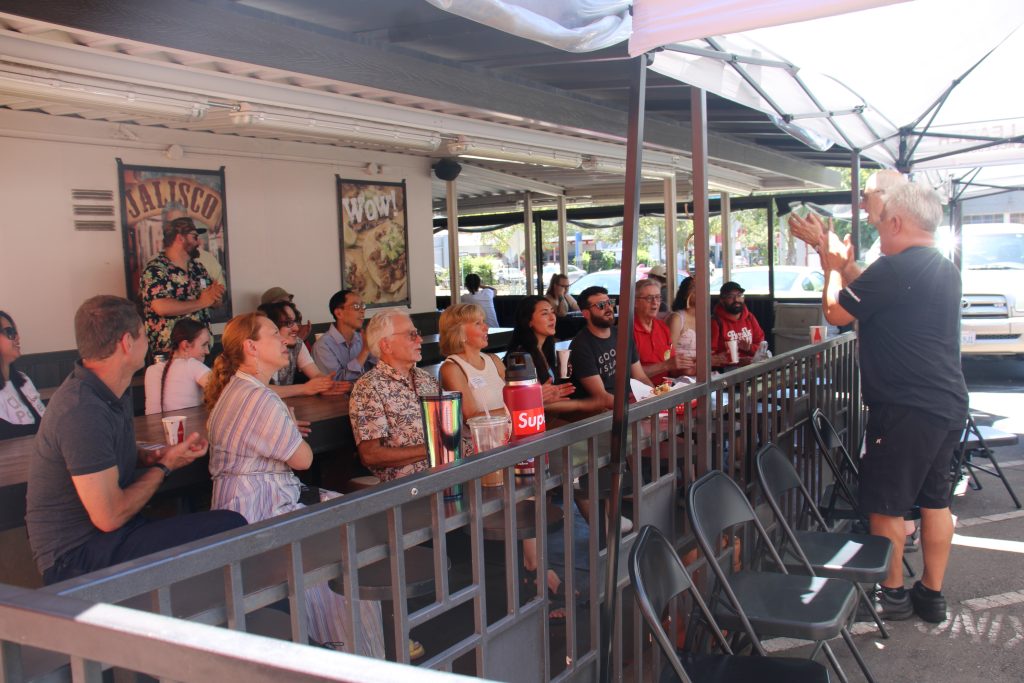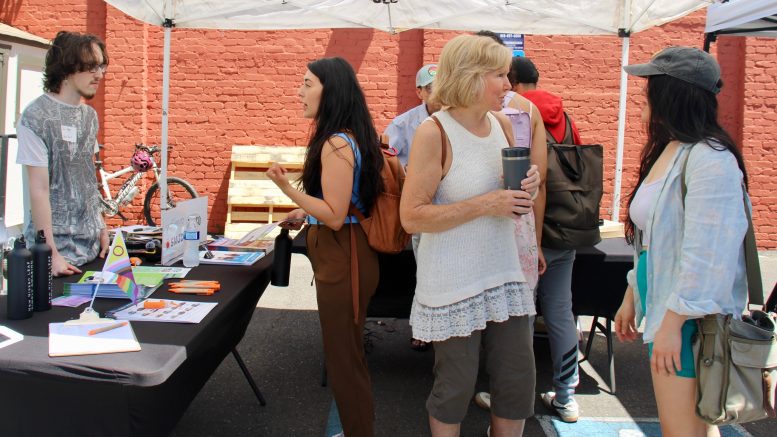By Hannah Ross
As Sacramento looks to build a more sustainable and inclusive economy, in part thanks to an influx of state funding set to benefit growing sectors, Valley Vision asked residents how they would like this development to look.
In its latest Inclusive Economy poll, Sacramentans identified community-driven, inclusive growth and green “climate-friendly” developments as the top two priorities from a list of regional economic concerns.
CleanStart, a local clean-technology development nonprofit, is helping facilitate this inclusive green-tech growth. CleanStart has been working to bridge gaps in clean-tech accessibility since 2005, and with the help of SMUD’s Shine Award and an Innovation Grant from the City of Sacramento, they have launched the Clean Tech for All initiative, a 10-month-long series of workshops that seek to engage the Alkali Flats community on the potential impacts of clean tech in their neighborhood.
The Initiative will emphasize gathering community input on desired improvements and connecting regional clean-tech entrepreneurs with residents directly, to tailor their products to hyperlocal needs. CleanStart believes this strategy will help combat a trend in clean tech predominantly targeting upper-income groups, leaving disadvantaged neighborhoods behind on important innovations.
We spoke with CleanStart Executive Director Thomas Hall, who has been with the nonprofit since 2016, and Partnership and Community Engagement Manager Christina Granados who has been leading the Alkali Flats project which aims to make clean tech accessible and inclusive in Sacramento.
Tell me about CleanStart and how it relates to Sacramento’s quest to build a sustainable and inclusive economy.
Hall: CleanStart has a long history, going back to 2005 when it was founded under SARTA, the Sacramento Area Regional Technology Alliance. Gary Simon, [who founded] CleanStart, wanted a way to build more clean-tech companies in Sacramento. So SMUD and the California Energy Commission commissioned a study to figure out how they would build a community here. They said, “We need a place where people can get together and connect and discuss things.”
Since 2016, we’ve been working to build this beehive of activity and getting people connected. In our opinion, we don’t know what all the solutions are, but we know that it’s going to happen when people talk together and work together.
When we’re looking at changing our infrastructure, changing our modes of transportation, our entire energy system, we can do that together. You’ve probably heard the phrase: If you want to go fast, go alone. If you want to go far, go together. Well, if you’re trying to build something that’s in an apartment, and all these old apartments, they all are different. You can’t go to the new construction homes and be like, “How does my technology fit in there?” That’s only a tiny part of our housing stock. How does it address everyone else that’s out there? And how do they get the technology into their hands? And also, how do they afford it?
We’re lucky to be in a publicly-owned utility space. So they’re very responsive to what their stakeholders, who vote for their board, are interested in. The [SMUD] Shine [program] also funds this project. They want to support the energy transition at the community level.
At CleanStart, which is an entrepreneurial support organization, we always talk about, [if] you’re building a product, how do you go to market on it? In the traditional sense, you go to the early adopters, but we’re fighting climate change and we have money to make a transition in our entire economy.
So we need to not think about the people who want to do cool technology, we need to think about the people that are in Alkali Flats that don’t have any grocery stores, that have poor access to transportation. … Is hydrogen storage really going to have [an] impact on someone who’s renting in that neighborhood? Maybe, but they won’t really feel it, or it won’t do a whole lot for their air quality. We want to try to get things that impact their life and potentially change it.
What do you see as some of the major factors driving the inability to launch certain clean-tech industries in Sacramento?
Hall: We’ve had great success with solar companies, gas and bio companies, and renewable fuel companies coming out of here. [We’ve also had] great success with companies that are good at tracking and monitoring emissions and fuel credits. But when it comes to getting traction on community projects, the fact is: I don’t know, and that’s why we’re going out there.
There’s a massive amount of federal money they’re still trying to get out the door — there’s money for everything from weatherization to advanced hydrogen research. I’m really hoping that that energy continues at the federal level, but I’m terrified.

Tell me about the Clean Tech for All initiative. How will it help bridge gaps in clean tech accessibility in Sacramento?
Granados: It’s a slow, friendly community initiative that slowly engages you into the realm of clean tech. A lot of these things are focused on one specific thing: let’s try to get the community interested in EVs, let’s try to get people interested in solar. For this program, we’re trying to introduce [clean tech] to people that are low-income and people of color. If you’re struggling to pay your bills, rent and things of that nature, you’re not really focused on this EV that’s $30,000.
For this initiative, we’re doing eight various workshops, and it’s led by the community. We need to hear from the actual community and hear what they want, and we tailor the focus of the workshops to them.
If the community tells us, “Hey, we have issues getting our groceries, getting to work” — Alkali Flats, they’re a food desert, they don’t have grocery stores out there. The more people tell us this, we’re able to [establish mobility hubs to] get either free EV mobility … or very cheap scooters and bikes.
If people are low-income homeowners, one of the workshops will be about various programs that will help them upgrade their house for free or very low cost with different incentives.
One of the workshops that I’m really excited about … is an introduction to green-tech careers. We’re going to have a training with a hands-on project, where you’re going to make a solar-powered phone charger. … You don’t have to be an engineer to start getting into these careers.
It’s something that bridges the gap, because it’s a little leap versus trying to take people over the Grand Canyon. … I’ll hold your hand. … You need training? OK, let me focus on training with you. You’re not really sure about EVs? OK, let me explain it to you via a mobility hub.
It’s an incentive that’s focused on community and seeing what the actual community needs [are], versus just going out there and saying, “We’re gonna do this and we hope that they like it.” Instead, it’s talking to people, going out and seeing what you guys actually need and what you want in the area.
What do you see as the most promising solutions to addressing the issue of building a sustainable and inclusive economy?
Granados: We have a huge community of people that are minorities and people that are low income and working middle-class or even lower, and the biggest thing in order to get people [onboard with] this [clean tech] movement … [is getting] out into the community, educating, and slowly getting them into the transition with, for one, training — technical training and careers — and then two, seeing what people actually want in their community and neighborhoods, and slowly introducing the idea of clean tech and how it can actually make a difference in their lives.
[Clean tech] can benefit you. It can help you. It’s for your children. It’s for your children’s children, so they can have cleaner air and better resources. And I think the way you reach people is [helping them] understand how it can actually help now, because when you’re struggling, you want to know how something can help now.
Before CleanStart, I was involved in workforce development, and the No. 1 thing is always training. People wanted training: What can I do to get better paying jobs? What can I do to get a career that’s long-lasting? And I feel like there’s a big untapped market that is coming to Sacramento, or that is already here in the [clean-tech] industry with repairing machinery, like the chargers for EVs, or being able to know how to work on vehicles…that’s not really being addressed [in our workforce].
How does CleanStart incorporate some of these solutions into its actions and advocacy?
Granados: Before the Alkali Flats project got started, we hosted meetups. We do various meetups that focus on hot-button issues that people are interested in in the community, so that we can educate people on various things like AI and the grid -[and] battery storage.
We also do more casual meetups. We have a Power Up coming up at the end of this month, which is a casual meetup to bring different entrepreneurs in the industry together.
We are also looking for clean tech ambassadors for the area to help us spread the word of clean tech. We’re looking for people that are interested in the Alkali Flats project and people who are interested in helping the community. We’re able to provide them with a small stipend.
Hall: [The Clean Tech for All initiative] has been something that we’ve wanted to do for a long time, of connecting the technology with the community. And I think finally, we’re getting a lot more attention to it. You see all this federal spending, state spending, that they want to spend in a way that’s equitable, right? It’s government money. It’s supposed to go to places that are supporting [harder to] reach communities.
This story is part of the Solving Sacramento journalism collaborative. Solving Sacramento is supported by funding from the James Irvine Foundation and James B. McClatchy Foundation. Our partners include California Groundbreakers, Capital Public Radio, Outword, Russian America Media, Sacramento Business Journal, Sacramento News & Review, Sacramento Observer and Univision 19.


Be the first to comment on "CleanStart’s Thomas Hall and Christina Granados on the importance of community outreach in clean-tech development"